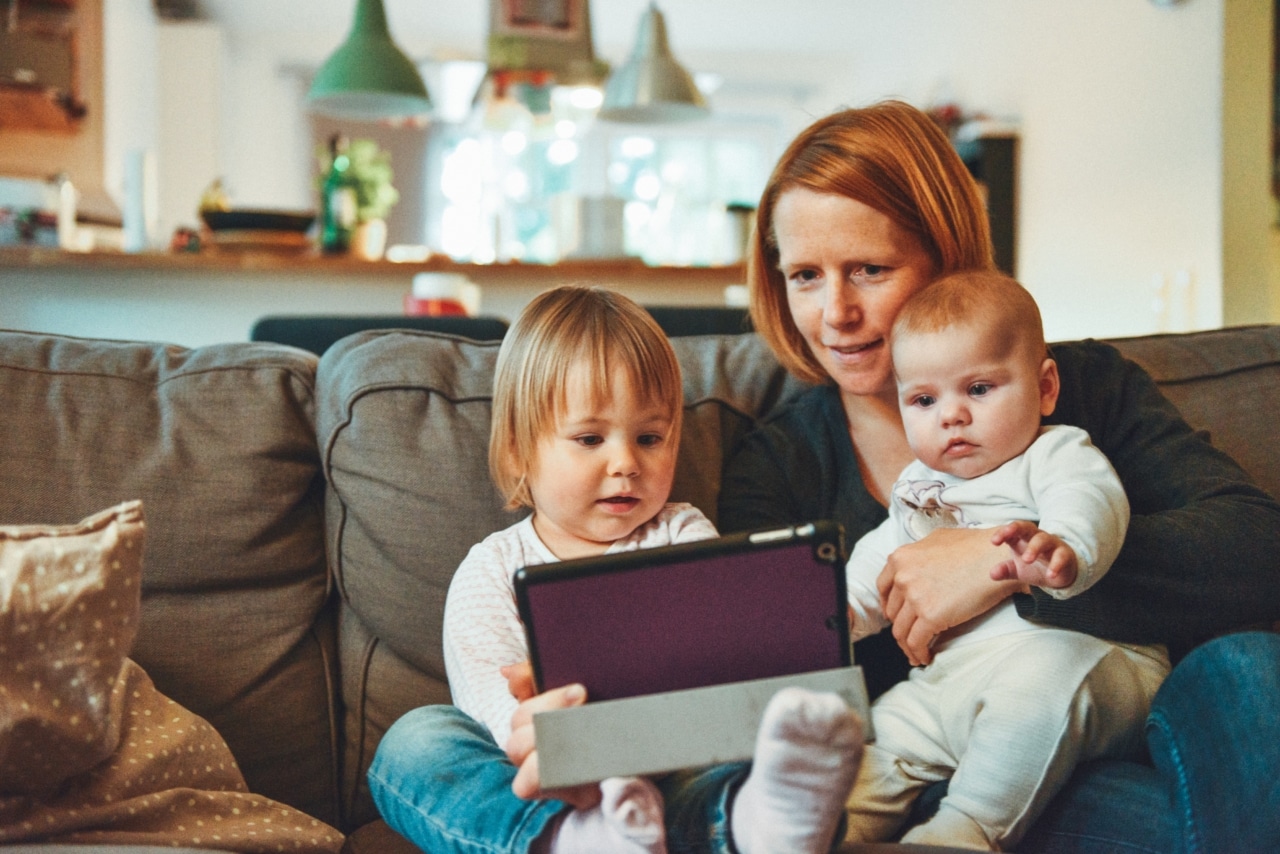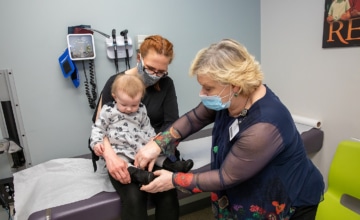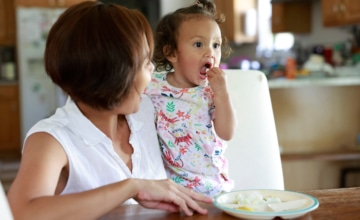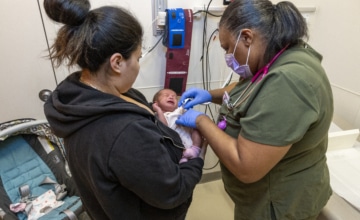Alyssa S. Meuwissen, University of Minnesota

Abstract
The COVID-19 pandemic has significantly changed the environment in which young children are developing. This article explores the question: How might this reduction in social interactions with peers impact the social development of the youngest children? Social skills rely on a foundation of cognitive and emotional skills that are prerequisites to successful social interactions. Developing social skills takes practice, and children without that practice may need time and experience to catch up. It is imperative that adults, including early childhood education (ECE) program providers, are prepared to support the development of complex social and emotional skills of children living through the pandemic. By intentionally supporting skills for young children in this environment, we can promote meaningful life-long relationships.
Victor is a 4-month-old who stayed home with his parents for the first 8 weeks of his life. When he was 2 months old, his parents enrolled him in an early childhood education (ECE) program, but Victor contracted respiratory syncytial virus (commonly known as RSV, a virus that can cause dangerous respiratory infections in infants) in his first few weeks there. His parents took Victor out of the program because they were concerned about disease transmission and tried to work from home while caring for him. When that became too much to handle after a few weeks, they enrolled Victor in a different center that was more expensive, but which they hoped would be safer. However, there was a COVID exposure there and Victor had to stay home again for a few weeks. His new provider wonders, “How has Victor experienced all of these changes in caregiving arrangements in his first few months of life? What impact has the stress of these situations had on his parents, who are trying to keep jobs and care for their new child?”
Cristina is a 2-year-old who has been taken care of by her grandmother a good deal of the time during the pandemic. During the winter, they mostly stayed at home, but in the spring, they went to a playground. Whenever another child got too close to Cristina, she would freeze. When a child approached her and asked her name, she started crying. Her grandma wants to know, “Is Cristina just a naturally shy child or is this because of the pandemic? What can I do to make her more comfortable around other children?”
Maya is a 3-year-old who hasn’t had any children come over to her house in a very long time. When her cousins came for a visit over the holidays, she was very excited to see them and kept hugging them, but then became so dysregulated whenever they tried to play with any of her toys that she couldn’t engage in any meaningful play. Her father thinks, “Why can’t Maya play happily with these children that she’s been so excited to see? Isn’t she old enough to be able to share?”
Bruno began preschool in the fall. For the first few months, he would interact with other children, but was often homesick and would spend time wandering around the room by himself. He didn’t know the names of his classmates even after weeks of being in school. His teacher wonders, “Is wearing masks making it harder for him to match names and faces? How can we make sure to connect with him as he’s wandering around at the same time other children are more demanding of our attention?”
All children who are currently between birth and 3 years old have lived all or most of their lives in a pandemic context. As the previous vignettes show, there are many questions caregivers have about their children’s experiences during the pandemic. One of the largest impacts the pandemic has had on the lives of young children is the limits placed on opportunities to interact with peers. Many children who would have gone to an ECE program instead spent much more of their time at home (Childcareaware.org, n.d.). What were once common activities for families with young children, such as playdates, library story hours, children’s museums, informal interactions with neighbors and relatives, and visits to restaurants, now involve carefully weighed decisions, balancing physical safety from the virus versus opportunities that support children’s social, emotional, and cognitive development. This article explores the question: How might this reduction in social interactions with peers impact the social development of the youngest children?
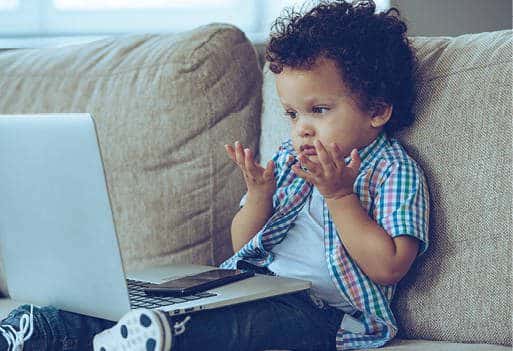
All children who are currently between birth and 3 years old have lived all or most of their lives in a pandemic context. Photo: shutterstock/G-Stock Studio
Child Development Perspectives About the Impact of the Pandemic
Studies of children across time and across cultures clearly show that children can adapt to many different environments. Children have been developing the expected complex social skills for hundreds of years across the globe, which have included many different arrangements for the care of young children. Settings where very young children are taken care of in groups, such as ECE programs and even kindergarten, are a relatively recent “invention” in Western societies and were fairly rare before women became a major part of the workforce (Michel, 2011). In many societies, young children stayed home with their nuclear family, and less focus was put on interactions with same-aged peers. In other cultures, children have been cared for through informal cooperative arrangements among adults of multiple generations. While high-quality kindergarten and preschool are great resources for preparing children’s academic skills (Ansari et al., 2020; Dhuey, 2011), the rarity of group care settings across time and cultures suggests that the period from birth to 3 years (or any other specific later age) is unlikely to be a “critical period” for learning how to interact with peers. Indeed, people can make new friends at many different ages, and as children’s brains grow from elementary school through young adulthood, their peer interactions become vastly more complex, and they continually learn to re-adjust to the expectations and roles in their social environment.
One helpful way of categorizing types of learning is experience-expectant versus experience-dependent processes (Greenough et al., 1987). Experience-expectant processes are based on information that the brain expects to be present in the environment at a specific time. It occurs in systems that are genetically set to learn, such as vision or language. If infants lack exposure to these inputs during a specific developmental period, the neurons that would typically be devoted to processing them will be pruned away. In contrast, experience-dependent processes are involved in learning that can be done at any time and allow humans to learn a huge variety of skills at any times in their lives (e.g., nursery rhymes, soccer, knitting). To do so, brains form new synapses rather than pruning neurons. Viewing children’s social skills as an experience-dependent process emphasizes that learning such skills will take practice and repetition, not simply aging, to develop competence (Meuwissen, 2021).
Social Skills and Their Importance
The COVID-19 pandemic can be viewed as a “natural experiment” in which a sudden major change was made in human environments, and the data are not yet available as to what the long-term impacts will be. It is the first time in human history that nearly all families across the globe are being challenged to care for their children in an environment that is significantly different than what it has been in the past. For young children, maturation and brain development were not put on hold during the pandemic, but occurred in whatever context they were in. To think about the impact of the pandemic, it is first helpful to think about what normative social development looks like and why these skills are important.
In a typical developmental trajectory, social behavior is rapidly evolving from birth to 3. Infants are very interested in other people, including other children, and from about 6 months on may seek out and respond to other children. One-year-olds are beginning to develop basic skills such as joint attention and the ability to act empathetically, but their ability to sustain interactive play is limited, and skills such as sharing and taking turns still need significant adult support. Two-year-olds still do a lot of parallel play, but they begin to engage in pretend play, including interactions with others, and have more skills that allow for some cooperation and problem-solving. Three-year-olds can develop specific sustained friendships that can be important attachment figures. They seek out friends with similar interests or characteristics and can better understand the perspectives of other people. They can engage in elaborate fantasy worlds or build complex creations with other children (Landy, 2009).
Peer interactions provide specific developmental input that is different from other relationships. Interactions with primary caregivers are crucial for developing expectations about relationships that last across the lifespan (Center on the Developing Child, 2004). Adult–child interactions can provide important opportunities for developing skills such as empathy, perspective-taking, and focused play, which all support social competence. However, adult—child interactions have a large power difference, and they are between two people with distinctly separate roles. Thus, peer interactions are specifically important for learning how to interact with an equal partner, and are key for skills such as cooperation, negotiation, and problem-solving (Pepler & Bierman, 2018). Sibling interactions can be more similar in the skills they promote, however, there is still typically a difference in power, as well as higher levels of conflict than in peer interactions (McHale et al., 2012). Peer interactions are unique in that they involve choosing to play with the other person. Children are very motivated to be included and liked by other children, and thus may be driven to learn new skills or adapt to new experiences because of the presence of peers. Being in group care settings requires children to be more independent and navigate a more complex web of relationships that may feel very different from time at home.
A goal of the preschool period is to prepare children to successfully adapt to school. Humans are driven by relationships at all ages. The brain prioritizes feeling safe and accepted before it can learn. Therefore, when children are preoccupied with separation anxiety or feel dysregulated or not accepted by peers, it will be harder for them to learn. In contrast, when children have friends and have developed a self-concept of being socially competent, this can be a great driver of positive feelings about school and motivation to try new things and be engaged in learning (Center on the Developing Child, 2004). Early friendships also build lifelong skills of collaboration and provide experiences with meaningful relationships with others, which are key to resilience across the lifespan.
Potential Pandemic Problems
The pandemic has impacted every family, and yet no family in the exact same way. Some children’s parents are essential workers, and these children continued in their ECE programs, which may have been disrupted by closures or absent teachers, and the risk of COVID exposure at the program may have been a source of stress and worry for the family. Some children may have been home with parents who were trying to work from home, resulting in the parents being less physically and emotionally available than they otherwise would have been. Some parents weren’t working or stopped working and were home with children all day with very little opportunity for outings or connection with other people. In many cases, the pandemic has impacted parents’ and other caregivers’ ability to be regulated and attentive to children. Some children have experienced much greater stress, such as the loss of a parent or an important caregiver, the loss of housing, the parental loss of a job leading to poverty or food insecurity, great unpredictability or chaos in their environment, or exposure to civil unrest or natural disasters in the past 2 years. These types of large compounding experiences can build into toxic stress, which will have greater impact on children’s self-regulation and physiological systems, which can be expected to lead to more difficulties with behavior regulation and peer interaction. Positive, stable relationships with people outside the home, such as teachers, can also be an important buffer to children who are experiencing a lot of stress at home, and disruption or loss of these supports for families could have a negative impact on the family system.
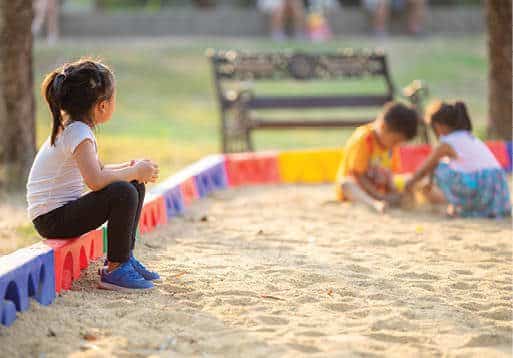
One of the largest impacts the pandemic has had on the lives of young children is the limits placed on opportunities to interact with peers. Photo: shutterstock/Teerawat Anothaistaporn
Mental Health
Research shows that increased uncertainty, disrupted routines, family stress, and parental mental health issues do impact even the youngest children. Racial inequities have only widened during the pandemic. Parents have reported increased behavior problems in young children during the pandemic, suggest- ing that impacts are being noted across the family system (University of Oregon, 2021). Dr. Bruce Perry (Perry & Winfrey, 2021) makes the distinction that it is more accurate to say that children are malleable rather than resilient. Children have a drive for positive development, and they have the capacity to achieve successful outcomes despite negative experiences, but they are not impervious to effects of the pandemic.
Grief
Many parents are experiencing grief about losing the childhood they had pictured for their child. A lack of the opportunity to celebrate culturally important events with loved ones, such as birthdays and holidays, separation from religious community, and feelings of isolation and boredom are very real for parents raising young children in this pandemic. Parents of children who are old enough to anticipate events hold the double burden of both their own and their child’s grief. While missing out on individual events may not create long-term damage to a child’s social skills, they do impact the family environment.
Variation in Social Experiences
Children’s personality and temperament will also interact with their experiences in the pandemic. Some children who naturally seek out others may be the most challenged by giving other children space, with being able to focus on their own work while other children are around, or with not overwhelming peers. Other children who are more inhibited or shy may struggle the most with difficulty separating from caregivers, discomfort or fear around other children, or being emotionally overwhelmed in new settings. For children who have missed out on practicing social skills with others, the transition from being at home to being in an ECE program may be a much more drastic change in environment than for children who grew up before the pandemic. Children may have a harder time separating from parents if that is new or unusual for them, and they may be more overwhelmed by the amount of stimulation in group care environments. Children who begin interacting with peers at 3 or 4 years old will not have the same level of social skills as children the same age who have had consistent practice with peers since infancy. It is likely that the pandemic will lead to adaptations that may not serve children as well in later group settings, and that it will take time and practice to learn the skills necessary for social competence.
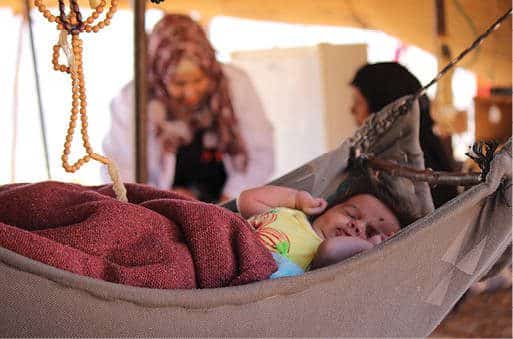
Children have been developing the expected complex social skills for hundreds of years across the globe, which have included many different arrangements for the care of young children. Photo:shutterstock/TalaZeitaw
Face Masks
A very visible change in the environment during the pandemic has been the presence of face masks. Babies have a strong preference for looking at faces from birth, including drawings or face-like shapes. Babies are biologically prepared to seek out faces, and caregivers’ emotional expressions provide crucial information about the world. Masks make caregivers’ faces less face-like and their expressions less visible. It is possible that masks could impact the reciprocal interactions that are so crucial to infants’ development (Green et al., 2021). One study found face masks on photos of adults had only a very small negative impact on preschoolers’ ability to identify emotions, but much research still needs to be done (Schneider et al., 2022). For children who are interacting with peers who are wearing masks, not being able to see each other’s faces may make it more difficult to understand developing speech, learn and remember names of playmates, and quickly detect changes in emotions during social interactions. Masks appear to be another aspect of the pandemic that children can adapt to but that may make the barrier to successful social interactions with peers a little higher.
How Can Adults Support Children’s Social Skills?
There are multiple ways that adults can intentionally build children’s social skills in a pandemic context, including supporting foundational skills and promoting safe social interactions.
Promote Foundational Developmental Skills
Social skills in young children are complex and depend on a foundation of more basic skills. By promoting these basic skills, children may be able to grow their social skills and adapt to more sophisticated social environments more quickly.
Language Skills
To play with others, it is essential that children can communicate what they are thinking and be understood by their partner(s). Thus, children with more language skills are better prepared to be more successful and less frustrated when interacting with other children (Mulvey & Jenkins, 2021). Interactions with peers are also inherently emotional—from fun and exciting to frustrating and saddening. Being able to understand and express emotions is important, and helping children label emotions specifically (e.g., sad, frustrated, angry vs. just “bad”) is also a precursor to social skills.
Ways to practice:
- When talking to children, label objects, expand on what children can say, and describe what is happening in the world.
- Singing and playing are great ways to promote vocabulary and help children learn and remember new words.
- Read, read, read—and pay attention to the emotions of the characters in the story, discuss how they express their emotions and what they do when they have big emotions.
Self-Regulation
Language and emotion language feed into self-regulation skills. The ability to manage one’s own emotions and stay calm and regulated enough to sustain an interaction is one of the more difficult parts of social interactions for young children. Children who are not being successful in social interactions may have emotions that are overwhelming their ability to self-regulate. It takes strong inhibition skills for children to wait their turn or not grab the toy they want. The ability to control one’s actions is a developmental skill that improves markedly between 3 and 5 years old, and it’s normal for children to know a rule before they can consistently follow it (Meuwissen & Zelazo, 2014).
Ways to practice:
- Play games that require children to stop their body, such as freeze tag, red light/green light, or Simon says.
- Find some strategies that your child can use when they experience big emotions, such as taking deep breaths or hugging themselves.
- Talk out loud about the times that you are frustrated or disappointed and model acknowledging the emotion and problem-solving in a constructive way.
Theory of Mind
Theory of mind is the ability to understand what someone else thinks or feels, and that it can be different from what you yourself think or feel. Young children are predisposed to be ego-centric, meaning that they have a hard time taking other people’s perspectives and see the world as centered around themselves. Sustained interactions with others necessitate understanding what someone else would like. Compromising and negotiating take substantial theory of mind. This skill also develops greatly between 3 and 5 years old (Wellman, 2018).
Ways to practice:
- Talk about the connection between what other people feel and how they behave. This can be done with people, babies, pets, or fictional characters.
- Talk about what goes on inside people’s heads—wanting, feeling, liking, thinking, knowing.
- Point out when two people think or feel differently about something.
Knowledge of Social Expectations
Social competence also involves knowing a set of “rules” of behavior. For example, a person should tell others their name when meeting them for the first time, take turns when playing a game, and ask to join in with other children playing. While it’s not the same practicing these skills without other children, adults can provide “dress rehearsal” experiences that will provide familiarity with the concepts when children do have the chance to interact with peers. Pretend play is the perfect way to practice such skills, because it allows some distance from the emotions—children are actually better at solving problems in pretend than they are in reality (Carlson et al., 2014). Ways to practice:
- Act out meeting someone and asking to play (can be done with puppets, stuffed animals, etc.). Model kind and polite language when pretending.
- Introduce social dilemmas into the child’s pretend play. What if piggy wants to go the barn but cow wants to go swimming? How could bulldozer and excavator work things out if they both wanted to dig in the same spot?
- Choose TV and media content that shows positive interactions between children and intentionally teaches skills like sharing, identifying emotions, and being kind. Barney, Sesame Street, Daniel Tiger, and Alma’s Way are some examples.
Encourage Interactions in Safer Contexts
It is important to acknowledge that every decision has a trade-off, and families and schools are being put in the nearly impossible position of trying to balance physical safety with promoting children’s holistic development. Yet, given the length of this pandemic, it is important to pay attention to children’s social development and possibly be creative in providing opportunities.
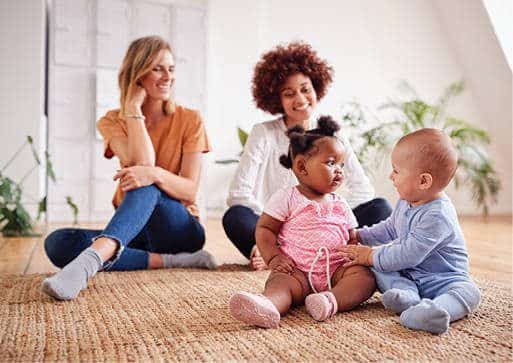
Infants are very interested in other people, including other children, and from about 6 months on may seek out and respond to other children. Photo: shutterstock/Monkey Business Image
Encouraging people to meet up outside may be one of the simplest ways to promote safe child interactions that may not need to require masks. There is growing research that shows the benefits of outdoor play for children (Kemple et al., 2016), and this is something professionals can emphasize to parents and the ECE workforce during this pandemic. In many climates, availability of winter gear for both children and adults is essential for outdoor play. While it may take time to build up tolerance, children can adapt to playing outside in a range of cold and heat given the appropriate clothing and hydration.
Interacting with other children online is another option. With children 3 years and younger, online interactions can be difficult because much of young children’s play is object-focused rather than verbal, and it is very different from in-person interactions because there is no opportunity to learn sharing or taking turns. However, video calls can provide children with the sense that other children are in the world and interested in them. They can also be important in marking holidays and celebrations with a sense of family or community. To support online interactions between very young children, expect to keep them very brief, and plan a specific activity. For young children, singing a song or reading a book “together” or doing “show and tell” with a few toys can work. For older children, parallel play where both children are playing with things like play-dough or blocks can provide a concrete thing to show and talk about.
Supporting the ECE Workforce
For the foreseeable future, cohorts of children entering ECE programs are going to have had less experience interacting with other children and will likely take longer to adapt to the expectations and demands of a social environment than in previous years. Much of the task of catching children up on their social skills will rely on ECE teachers. Staff shortages and the pressures of the pandemic are negatively impacting the stress and well-being levels for ECE professionals (University of Oregon, 2021). Systemic support is needed for these professionals to ensure they can be stable supports for children who have adapted to a pandemic context, especially for children from Black, Indigenous, and People of Color communities who are more likely to be punished for manifesting stress and trauma in their behavior (Gilliam et al., 2016). Policies that support the workforce are imperative in making these educational experiences positive forces for children’s social development.
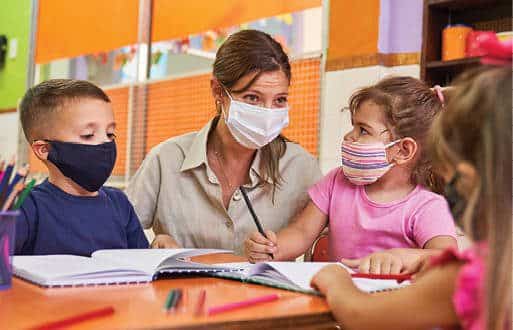
Being in group care settings requires children to be more independent and navigate a more complex web of relationships that may feel very different from time at home. Photo: shutterstock/Robert Kneschke
Workforce needs include:
- adequate number of staff to attend to children who may take more attention
- preservice training, professional development, and ongoing support around children’s social and emotional skills and reducing racial bias
- access to reflective consultation and/or infant mental health consultation to support providers in being able to respond to heightened needs of students
- acknowledgment and recognition of the crucial role this workforce plays in the development of children, and corresponding compensation
- support for referral systems and mental health services for children and families who have experienced greater toxic stress or require more targeted intervention
Social skills are complex, emotional, and take a lot of practice. This multiyear pandemic has added stress for adults and children and has taken away opportunities for typical childhood interactions. For many children, developing social skills will take some time, practice, and scaffolding from adults. For some children, it might take more specific intervention, and thus professionals need support in those roles. Parents, ECE providers, and preschool teachers are all essential in supporting and coaching young children so that they can develop the necessary skills to play and learn successfully. Children who have begun their early development in the pandemic still have great ongoing potential to learn social skills and develop meaningful friendships across their lives.
Author Bio
Alyssa S. Meuwissen, PhD, is a research associate at the Center for Early Education and Development at the Institute of Child Development, University of Minnesota. Her research focuses on supporting adult–child interactions, early childhood workforce well-being, and reflective practice.
Suggested Citation
Meuwissen, A. S. (2022). Social skill development of young children amid the pandemic. ZERO TO THREE Journal, 42(3), 37–43.
References
Ansari, A., Pianta, R. C., Whittaker, J. V., Vitiello, V. E., & Ruzek, E. A. (2020). Persistence and convergence: The end of kindergarten outcomes of pre-K graduates and their nonattending peers. Developmental Psychology. http:// dx.doi.org/10.1037/dev0001115. link
Carlson, S. M., White, R. E., & Davis-Unger, A. C. (2014). Evidence for a relation between executive function and pretense representation in preschool children. Cognitive Development, 29, 1–16.
Center on the Developing Child. (2004). Young children develop in an environment of relationships: Working Paper No. 1. link
Childcareaware.org. (n.d.). Child care data center & state fact sheets. link
Dhuey, E. (2011). Who benefits from kindergarten? Evidence from the introduction of state subsidization. Educational Evaluation and Policy Analysis, 33(1), 3–22.
Gilliam, W. S., Maupin, A. N., Reyes, C. R., Accavitti, M., & Schic, F. (2016). Do early educators’ implicit biases regarding sex and race relate to behavior expectations and recommendations of preschool expulsions and suspensions? Yale University Child Study Center. link
Brief_final_9_26_276766_5379_v1.pdf Green, J., Staff, L., Bromley, P., Jones, L., & Petty, J. (2021). The implications of face masks for babies and families during the COVID-19 pandemic: A discussion paper. Journal of Neonatal Nursing, 27(1), 21–25.
Greenough, W. T., Black, J. E., & Wallace, C. S. (1987). Experience and brain development. Child Development, 58(3), 539–559.
Kemple, K. M., Oh, J. H., Kenney, E., & Smith-Bonahue, T. (2016). The power of outdoor play and play in natural environments. Childhood Education, 92(6), 446–454.
Landy, S. (2009). Encouraging social competence, empathy, and caring behavior. In Pathways to competence: Encouraging healthy social and emotional development in young children (2nd ed., pp. 557–619). Brookes.
McHale, S. M., Updegraff, K. A., & Whiteman, S. D. (2012). Sibling relationships and influences in childhood and adolescence. Journal of Marriage and Family, 74(5), 913–930.
Meuwissen, A. S. (2021). Will our kids be okay? Parents’ concerns about the pandemic’s effect on children. College of Education and Human Development. link
Meuwissen, A. S., & Zelazo, P. D. (2014). Hot and cool executive function: Foundations for learning and healthy development. ZERO TO THREE Journal, 35(2), 18–23.
Michel, S. (2011). The history of child care in the U.S. Social Welfare History Project. link
Mulvey, N., & Jenkins, L. (2021). Language skills as predictors of social skills and behaviors in preschool children. Contemporary School Psychology, 25(4), 503–514.
Pepler, D. J., & Bierman, K. L. (2018). With a little help from my friends: The importance of peer relationships for social-emotional development. Edna Bennett Pierce Prevention Research Center, Pennsylvania State University.
Perry, B. D., & Winfrey, O. (2021). What happened to you: Conversations on trauma, resilience, and healing. Flatiron Books.
Schneider, J., Sandoz, V., & Lucile, E. (2022). The role of face masks in the recognition of emotions by preschool children. JAMA Pediatrics, 176(1), 96–98.
University of Oregon, Center for Translational Neuroscience, RAPID-EC Research Group. (2021).* *Child care shortages weigh heavily on parents and providers. University of Oregon, Center for Translational Neuroscience. link
Wellman, H. M. (2018). Theory of mind: The state of the art. European Journal of Developmental Psychology, 15(6), 728–755.

